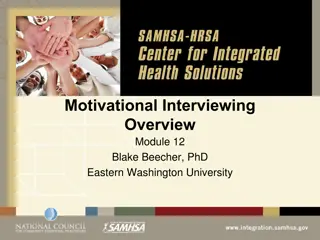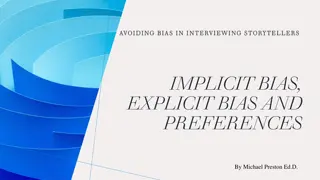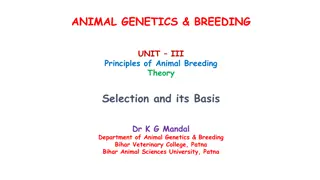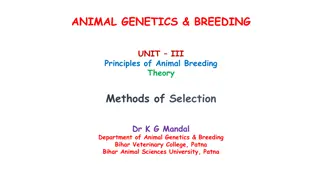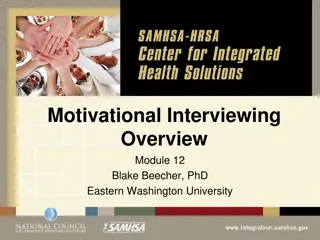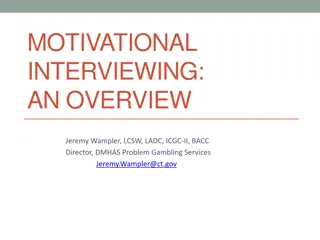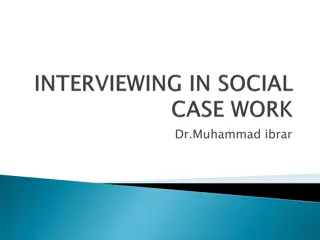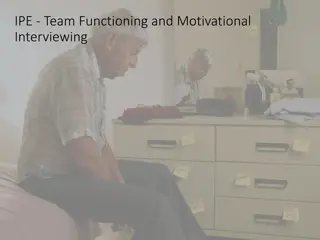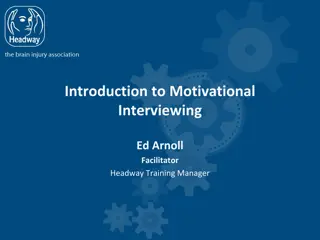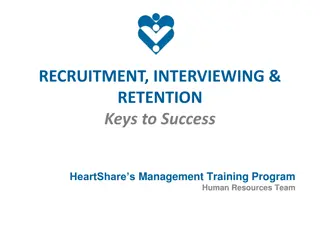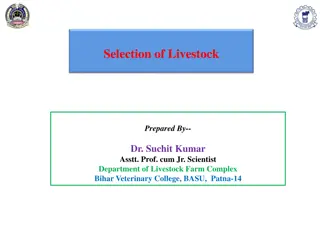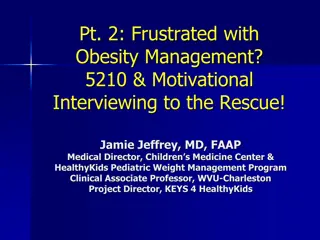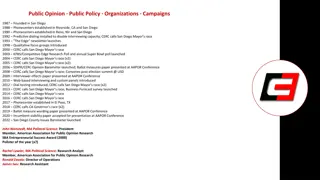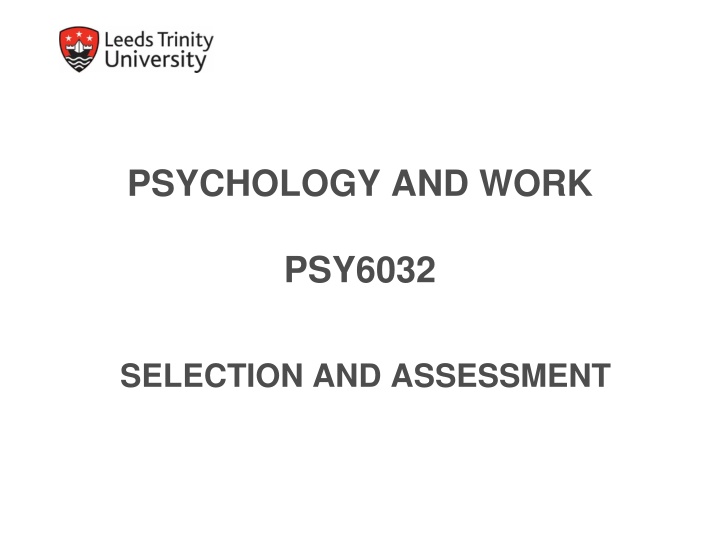
Selection and Assessment in Psychology and Work
Explore the importance of selection and assessment processes in the context of psychology and work, including recruitment methods, assessment techniques, and the evolving role of technology. Discover how recruitment and selection strategies have adapted to globalism, the pandemic, virtual work environments, and technological advancements.
Uploaded on | 0 Views
Download Presentation

Please find below an Image/Link to download the presentation.
The content on the website is provided AS IS for your information and personal use only. It may not be sold, licensed, or shared on other websites without obtaining consent from the author. If you encounter any issues during the download, it is possible that the publisher has removed the file from their server.
You are allowed to download the files provided on this website for personal or commercial use, subject to the condition that they are used lawfully. All files are the property of their respective owners.
The content on the website is provided AS IS for your information and personal use only. It may not be sold, licensed, or shared on other websites without obtaining consent from the author.
E N D
Presentation Transcript
PSYCHOLOGY AND WORK PSY6032 SELECTION AND ASSESSMENT
Lecture objectives: Understand the role of selection in a global, competitive economy Explore the employee recruitment and selection process Explore assessment methods used in the selection process
M. SUSAN TAYLOR AND CHRISTOPHER J. COLLINS "In the old days, hiring was a leisurely affair. The resumes would dribble in by mail and the first candidates wouldn't be called for weeks. It might take two months for the whole process to run its course. The new era is about speed. Resumes are sent by fax. Managers rush through the applications. Employees are hired within a week." (White, 1998)
Caggiano (1998) . Fierce Crucial to organisational survival and success competition in a variety of sectors for the best people The importance of recruiting the right people Human resources linked to success in global competition Future demand unknown need for adaptation
And the economy now? So why is recruitment and selection still important? Globalism The pandemic Virtual working Reliance on technologies
What is recruitment and selection? Process by which we aim to employ the most able and efficient workers to carry out a given task/job
SELECTION METHODS THE PROCESS Planning Conduct Task Analysis Conduct Job Analysis Establish the Person Specification Choose Assessment Method Appropriate Consider Person Job Fit Recruit the job incumbent
Activity 1: Design a Person Specification Write up a person specification for the job you chose from the prospects exercise. Use the Rodgers (1952) 7 point person specification below: 1. Physical make-up 2. Attainment 3. General Intelligence 4. Special aptitudes 5. Interests 6. Disposition 7. Circumstances
Methods used in recruitment and selection Application forms Telephone screening Interviewing Psychometric tests References Biodata (biographical) Work samples Assessment Centres and group selection Handwriting (graphology) Unofficial: Social media
Evaluation of the selection process: It must be a valid and reliable process It must be able to discriminate between candidates But it must not discriminate unfairly It must be practical in terms of administration Have a cost benefit Be seen to be fair by the candidates
What is a psychometric test? There are many definitions of a psychometric test, one, put forward by Cronbach (1984) is that it is: .a standardised sample of behaviour which can be described by a numerical scale or category system Psychometric tests are not just a random set of questions given to someone to find out what they know about a subject They are meticulously thought out, developed over several years or decades, even centuries and administered time after time to develop and refine them into precision measuring tools
Different types of psychometric test: There are a number of different types of Psychometric Test These vary, usually dependent on what we are trying to measure and for what purpose They are all designed and constructed in the same way More on psychometrics in the extra slides on Moodle
Personality Tests MBTI test: http://www.humanmetrics.com/personality International Personality Item Pool https://ipip.ori.org/index.htm
Worksamples: Usually a task that has been taken directly from part of a job Looks very like the types of tasks you would be asked to perform in a given job E.g. Valpar General Clerical comprises mail sorting and filing whilst taking telephone messages
Trainability tests: These are like a highly structured mini training exercise designed to assess whether someone has the potential to undertake a training course E.g. Fork Lift Truck driving test, aircraft simulator
Job simulation tests: Usually taken as part of assessment at an Assessment Centre Include in tray exercises Group problem solving exercises Analysis of a complex management situation
Dexterity tests: These are often work related and are designed to measure attributes like hand-eye co- ordination, speed of movement, fine motor co- ordination For example placing nuts and bolts using small tools etc.
Activity 2: Selection methods Methods used in recruitment and selection Choose, from the list on the right, which selection methods you would use to recruit someone to the job you have chosen? Application forms Telephone screening Interviewing Psychometric tests References Biodata (biographies) Work samples Assessment Centres and group selection Handwriting (graphology) For psychometric tests, indicate what types of tests you would use to measure what psychological construct
Selection Resources Arnold et al (2011) P.175 McKenna (2006) P.569 Robertson, I.T., & Smith, M. (2001). Personnel selection. Journal of Occupational and Organisational Psychology, 74, 441-472.
BUSINESS PSYCHOLOGY PSY6032 SELECTION AND ASSESSMENT INTERVIEWING
Learning Objectives: Understand the place of the interview within the recruitment and selection process. Understand the major types of interviews. Predict the structure and questions posed within a particular interview. Consider issues of validity, reliability and the utility of the interview process.
Recap What methods do we use in Recruitment and Selection? Application form Interviews* Psychometric tests Work samples Assessment centres References Biodata Handwriting (graphology)
Interviewing: Interviews were (and still are) the most popular forms of recruitment. Used for recruiting at all levels of the organisation an expectation by all. Advantages are that they are cheap, one-to-one, easy to arrange and are an expected form of assessment by both parties. Described as a conversation with a purpose.
Unstructured interviews: Questions are asked to establish whether a person is suitable for the job. These questions may or may not relate directly to the job. These interviews, it was found, had the potential to become subjective, unreliable and biased, therefore not necessarily recruiting the best person for the job.
Unstructured interviews: Interviewer s mind is often made up early (first 4- 5 minutes) likely to determine the type of questions posed. If the interviewer liked the candidate then they would offer easy questions, that the interviewer thought the candidate would be able to answer (halo effect). If the interviewer disliked the candidate, then the interviewer would ask difficult questions, that the candidate was unlikely to be able to answer (horns effect).
Unstructured interviews: We are likely to like or relate to people who are similar to ourselves. But does your organisation need to clone you to make it more successful? Organisations need a mix of abilities, talents and personalities.
Structured Interviewing: Questions asked are the same to each interviewee. The content of the questions are designed to reflect directly the job content (determined by the job analysis). The competencies required to carry out the job form the basis of the questions. Responses to questions are evaluated or rated against strict criteria. (e.g. on a simple scale of 1-5)
Reliability and validity of interviews: Wiesner and Cronshaw (1988) A meta-analytic investigation of the impact of interview format and degree of structure on the validity of the employment interview. Carried out a meta-analysis of unstructured and structured interviews. They found that the outcome (offered the job) of unstructured interviews correlated 0.17 with job performance. Whereas structured interviews correlated 0.34 with job performance an obvious improvement.
Behavioural Interviewing Janz (1989) Janz (1989) The patterned behaviour description interview: The best prophet of the future is the past. Questions are asked which invite interviewees to describe what behaviours they might have used to perform certain work related behaviours in the past The rationale applied here is that the best prophet of the future is the past
Behavioural Interviewing: For example Can you describe a time when you were confronted by an angry customer and describe how you dealt with them? Shouted at them until they shut up and went away. Gave them everything they wanted very quickly. Persuaded them to buy shares in the company.
Behavioural Interviewing: If these behaviours have been demonstrated previously then it is likely they can be performed again. However, it is important to try to establish how successfully these behaviours have been carried out. How successful this behaviour has been carried out is rated as objectively as possible against behavioural indicators.
Activity 3: Behavioural style interview questions https://www.youtube.com/watch?v=0nN7Q7DrI6 Q Using the job analysis you have completed for your chosen vocation, write down some questions using the behavioural style.
Behavioural interviewing problems: Behavioural interviewing relies on the notion that previous behaviour will predict future behaviour If you are a student, will you have had the opportunity to have demonstrated these skills through experience? If not then is this fair? How can you get round this? Never experienced that, but if I did, I would .
Situational Interviewing Latham and Saari (1984) and Maurer at al (1999) Latham & Saari (1984) Do people do what they say? Further studies on the situational interview. Similar to Behavioural Interviewing but instead of relying on past experience it relies on future intentions.
Situational Interviewing Latham and Saari (1984) and Maurer at al (1999) So the questions would be presented in the future not the past, for example: Can you tell me what you would do if you were confronted by an angry customer? Again the value of the answer would be rated objectively using behavioural indicators
Activity 4: Situational style questions Now redesign your questions adopting the situational style How do your questions differ? What are the respective difficulties of each style in terms of you answering them? Keep a list of your behavioural and situational questions.
Situational Interviewing problems: Situational interviewing relies on the notion that intentional behaviour will predict future behaviour. In truth, and given this is an interview for a job, how reflective will what we say in an interview be of our future work performance? We want the job at all cost what do we do?
Comparison of behavioural vs situational interviewing and future job performance. Pulakos & Schmitt (1995) Abstract: The experience-based interview questions 108 study participants relate how they had handled situations in the past requiring skills and abilities necessary for effective performance on the job. Situational-based interview questions 108 study participants, provided interviewees with hypothetical job-relevant situations and asked them how they would respond if they were confronted with these problems.
Comparison of behavioural vs situational interviewing and future job performance. Pulakos & Schmitt (1995) The experience based interview questions yielded higher levels of validity than the situational questions. Additional analyses showed that the interview added incrementally to the prediction of performance beyond the variance accounted for by a cognitive ability test. We might expect this outcome why?
Reliability and validity of interviews: Huffcutt et al (2001) Identification and meta- analytic assessment of psychological constructs measured in employment interviews. From their meta analysis they found that criterion-related validities for interviews compared similarly to those found for the use of cognitive/psychometric tests.
Activity 5: Practicing interview questions Pair up with another student: Take your list of behavioural and situational interview questions that you developed for your chosen job Swap with another student and practice asking these questions (each student is asked their questions for their job by the other) Give each other feedback on how to improve, share tips
Criticisms and issues: Impression Management by interviewee is there a hidden person/personality lying beneath the veneer of the interview? Should the interviewer try to chip away at this? Or, is this a necessary skill of adaptation to different situations?
Criticisms and issues: Impression management by the interviewer. Pretending the job or organisation is something it s not. Adverse impact if the interviewee considers the interview to have been unfair then they may bad mouth the company to others, work for a competitor, decline the offer of the job, boycott the company s products, legal challenge.
Characteristics of successful interviewees? Silvester et al (2002) Locus of control, attributions and impression management in the selection interview - looked at the characteristics of successful interviewees. They found that those interviewees who explained their own successes or failures in terms of their ability to control those events, were the most successful interviewees
Is there any way we can prepare for interviews? Tross and Maurer (2008) The effect of coaching interviewees on subsequent interview performance in structured experience-based interviews. Found that people given comprehensive coaching in interview technique, before interviews, performed better in them than those who did not.
Activity 6: Interview tips Explore the following links which give tips on how to perform well in interviews. Choose some of the tips to share with your colleagues https://www.monster.co.uk/career-advice/article/interview-tips https://www.reed.co.uk/career-advice/interview-techniques/preparing-for-a- job-interview/ https://www.prospects.ac.uk/careers-advice/interview-tips
Conclusions: Still the most favoured method within the recruitment process. Technology influence of Skype, the pandemic You are competing for British jobs in a global market. You are competing for global jobs in a global market.
Interviewing resources Sackett, P.R. and Lievenson, F. (2001) Personnel Selection, Annual Review of Psychology, 59, 419-45 Schmidt, F.L. and Hunter, J.E. (1998) The Validity and Utility of selection methods in personnel psychology: Practical and theoretical implications of 85 years of research findings. Psychological Bulletin. Vol 124. No 2, 262-274.
Further Reading: Arnold, J., & Randall et al. (2016). Work Psychology: Understanding human behaviour in the Workplace. Harlow: Pearson. (also available as an e-book) Chapter 4. McKenna, E. (2012). Business Psychology and Organisational Behaviour: Hove. Psychology Press. Chapter 18, pages 643-645.




